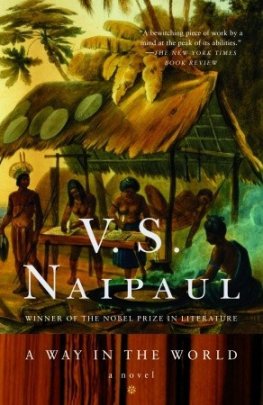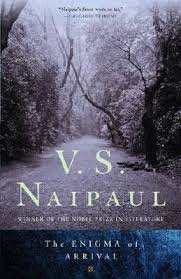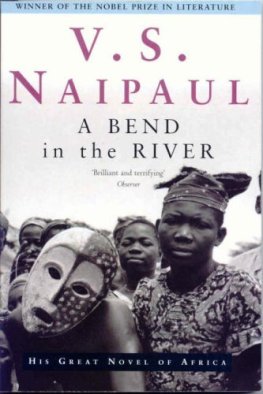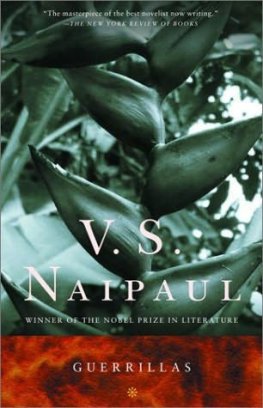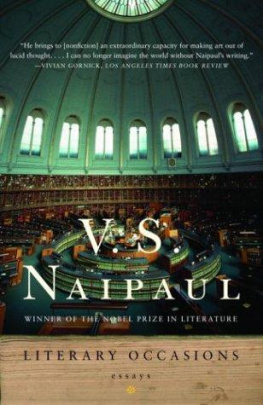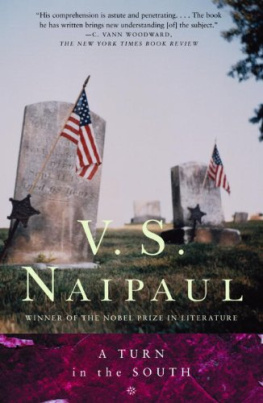Vidiadhar Surajprasad Naipaul - In a free state
Here you can read online Vidiadhar Surajprasad Naipaul - In a free state full text of the book (entire story) in english for free. Download pdf and epub, get meaning, cover and reviews about this ebook. year: 2002, publisher: Vintage International, genre: Detective and thriller. Description of the work, (preface) as well as reviews are available. Best literature library LitArk.com created for fans of good reading and offers a wide selection of genres:
Romance novel
Science fiction
Adventure
Detective
Science
History
Home and family
Prose
Art
Politics
Computer
Non-fiction
Religion
Business
Children
Humor
Choose a favorite category and find really read worthwhile books. Enjoy immersion in the world of imagination, feel the emotions of the characters or learn something new for yourself, make an fascinating discovery.

- Book:In a free state
- Author:
- Publisher:Vintage International
- Genre:
- Year:2002
- Rating:3 / 5
- Favourites:Add to favourites
- Your mark:
- 60
- 1
- 2
- 3
- 4
- 5
In a free state: summary, description and annotation
We offer to read an annotation, description, summary or preface (depends on what the author of the book "In a free state" wrote himself). If you haven't found the necessary information about the book — write in the comments, we will try to find it.
In a free state — read online for free the complete book (whole text) full work
Below is the text of the book, divided by pages. System saving the place of the last page read, allows you to conveniently read the book "In a free state" online for free, without having to search again every time where you left off. Put a bookmark, and you can go to the page where you finished reading at any time.
Font size:
Interval:
Bookmark:
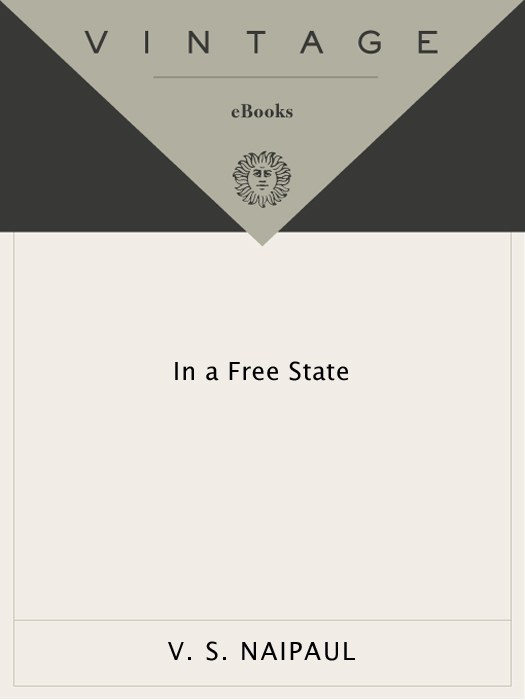
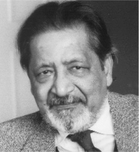
V. S. Naipaul
In a Free State
V. S. Naipaul was born in Trinidad in 1932. He went to England on a scholarship in 1950. After four years at Oxford he began to write, and since then he has followed no other profession. He is the author of more than twenty books of fiction and nonfiction and the recipient of numerous honors, including the Nobel Prize in 2001, the Booker Prize in 1971, and a knighthood for services to literature in 1990. He lives in Wiltshire, England.

ALSO BY V. S. NAIPAUL
NONFICTION
Between Father and Son: Family Letters
Beyond Belief: Islamic Excursions Among the Converted Peoples
India: A Million Mutinies Now
A Turn in the South
Finding the Center
Among the Believers
The Return of Eva Pern (with The Killings in Trinidad)
India: A Wounded Civilization
The Overcrowded Barracoon
The Loss of El Dorado
An Area of Darkness
The Middle Passage
FICTION
Half a Life
A Way in the World
The Enigma of Arrival
A Bend in the River
Guerrillas
A Flag on the Island
The Mimic Men
Mr. Stone and the Knights Companion
Miguel Street
A House for Mr. Biswas
The Suffrage of Elvira
The Mystic Masseur
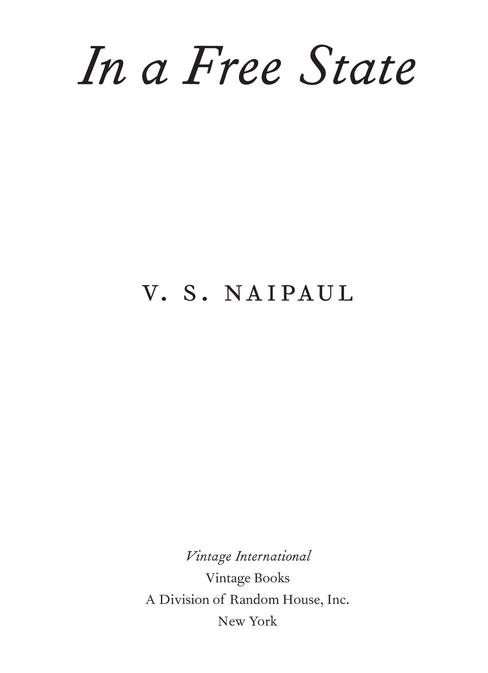
FIRST VINTAGE INTERNATIONAL EDITION, FEBRUARY 2002
Copyright 1971 by V. S. Naipaul
All rights reserved under International and Pan-American Copyright Conventions. Published in the United States by Vintage Books, a division of Random House, Inc., New York. Originally published in Great Britain by Andr Deutsch, Ltd. in 1971 and in the United States by Alfred A. Knopf in 1973.
Vintage is a registered trademark
and Vintage International and colophon
are trademarks of Random House, Inc.
Library of Congress Cataloging-in-Publication Data
Naipaul, V.S. (Vidiadhar Surajprasad), 1932
In a free state.
I. Title.
PR9272.9.N3215 823914 83-40301
eISBN: 978-0-307-78932-7
Author photographJerry Bauer
www.vintagebooks.com
v3.1
The Tramp at Piraeus
I T WAS ONLY a two-day crossing from Piraeus to Alexandria, but as soon as I saw the dingy little Greek steamer I felt I ought to have made other arrangements. Even from the quay it looked overcrowded, like a refugee ship; and when I went aboard I found there wasnt enough room for everybody.
There was no deck to speak of. The bar, open on two sides to the January wind, was the size of a cupboard. Three made a crowd there, and behind his little counter the little Greek barman, serving bad coffee, was in a bad mood. Many of the chairs in the small smoking-room, and a good deal of the floor space, had been seized by overnight passengers from Italy, among them a party of overgrown American schoolchildren in their mid-teens, white and subdued but watchful. The only other public room was the dining-room, and that was being got ready for the first of the lunch sittings by stewards who were as tired and bad-tempered as the barman. Greek civility was something we had left on shore; it belonged perhaps to idleness, unemployment and pastoral despair.
But we on the upper part of the ship were lucky. We had cabins and bunks. The people on the lower deck didnt. They were deck passengers; night and day they required only sleeping room. Below us now they sat or lay in the sun, sheltering from the wind, humped figures in Mediterranean black among the winches and orange-coloured bulkheads.
They were Egyptian Greeks. They were travelling to Egypt, but Egypt was no longer their home. They had been expelled; they were refugees. The invaders had left Egypt; after many humiliations Egypt was free; and these Greeks, the poor ones, who by simple skills had made themselves only just less poor than Egyptians, were the casualties of that freedom. Dingy Greek ships like ours had taken them out of Egypt. Now, briefly, they were going back, with tourists like ourselves, who were neutral, travelling only for the sights; with Lebanese businessmen; a troupe of Spanish night-club dancers; fat Egyptian students returning from Germany.
The tramp, when he appeared on the quay, looked very English; but that might only have been because we had no English people on board. From a distance he didnt look like a tramp. The hat and the rucksack, the lovat tweed jacket, the grey flannels and the boots might have belonged to a romantic wanderer of an earlier generation; in that rucksack there might have been a book of verse, a journal, the beginnings of a novel.
He was slender, of medium height, and he moved from the knees down, with short springy steps, each foot lifted high off the ground. It was a stylish walk, as stylish as his polka-dotted saffron neck-scarf. But when he came nearer we saw that all his clothes were in ruin, that the knot on his scarf was tight and grimy; that he was a tramp. When he came to the foot of the gangway he took off his hat, and we saw that he was an old man, with a tremulous worn face and wet blue eyes.
He looked up and saw us, his audience. He raced up the gangway, not using the hand-ropes. Vanity! He showed his ticket to the surly Greek; and then, not looking about him, asking no questions, he continued to move briskly, as though he knew his way around the ship. He turned into a passageway that led nowhere. With comical abruptness he swung right round on one heel and brought his foot down hard.
Purser, he said to the deck-boards, as though he had just remembered something. Ill go and see the purser.
And so he picked his way to his cabin and bunk.
Our sailing was delayed. While their places in the smoking-room were being watched over, some of the American schoolchildren had gone ashore to buy food; we were waiting for them to come back. As soon as they did no giggles: the girls were plain, pale and abashed the Greeks became especially furious and rushed. The Greek language grated like the anchor chain. Water began to separate us from the quay and we could see, not far from where we had been, the great black hulk of the liner Leonardo da Vinci, just docked.
The tramp reappeared. He was without his hat and rucksack and looked less nervous. Hands in trouser pockets already stuffed and bulging, legs apart, he stood on the narrow deck like an experienced sea-traveller exposing himself to the first sea breeze of a real cruise. He was also assessing the passengers; he was looking for company. He ignored people who stared at him; when others, responding to his own stare, turned to look at him he swivelled his head away.
In the end he went and stood beside a tall blond young man. His instinct had guided him well. The man he had chosen was a Yugoslav who, until the day before, had never been out of Yugoslavia. The Yugoslav was willing to listen. He was baffled by the tramps accent but he smiled encouragingly; and the tramp spoke on.
Font size:
Interval:
Bookmark:
Similar books «In a free state»
Look at similar books to In a free state. We have selected literature similar in name and meaning in the hope of providing readers with more options to find new, interesting, not yet read works.
Discussion, reviews of the book In a free state and just readers' own opinions. Leave your comments, write what you think about the work, its meaning or the main characters. Specify what exactly you liked and what you didn't like, and why you think so.

